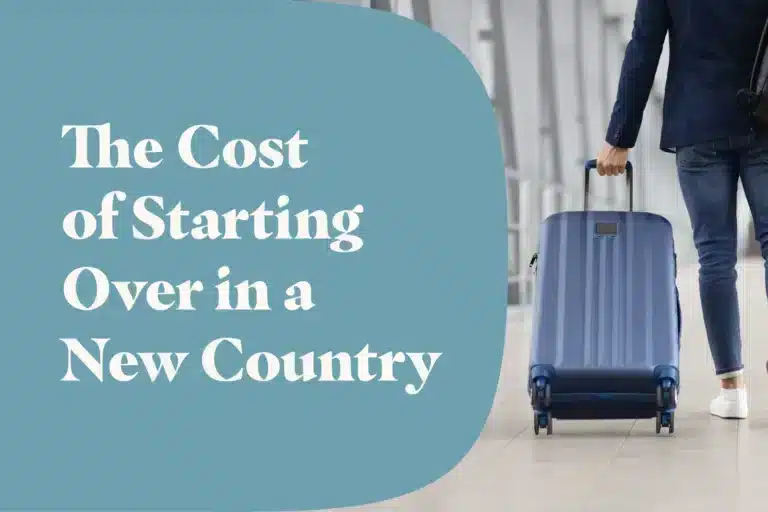Some people may find the dream of starting over in a new country a step too far, especially when economic concerns are factored in. We wanted to explore what kind of costs you could expect when moving to different cities worldwide to start afresh.
To do this, we looked at a range of essential expenditures – from the cost of a working visa to initial outlays like six months’ rent, utilities, groceries, transport, and basic furnishings. For those keen to dive into the specifics, a full breakdown of our calculations is available in the methodology below.
Which cities are most accessible for those looking to move abroad?
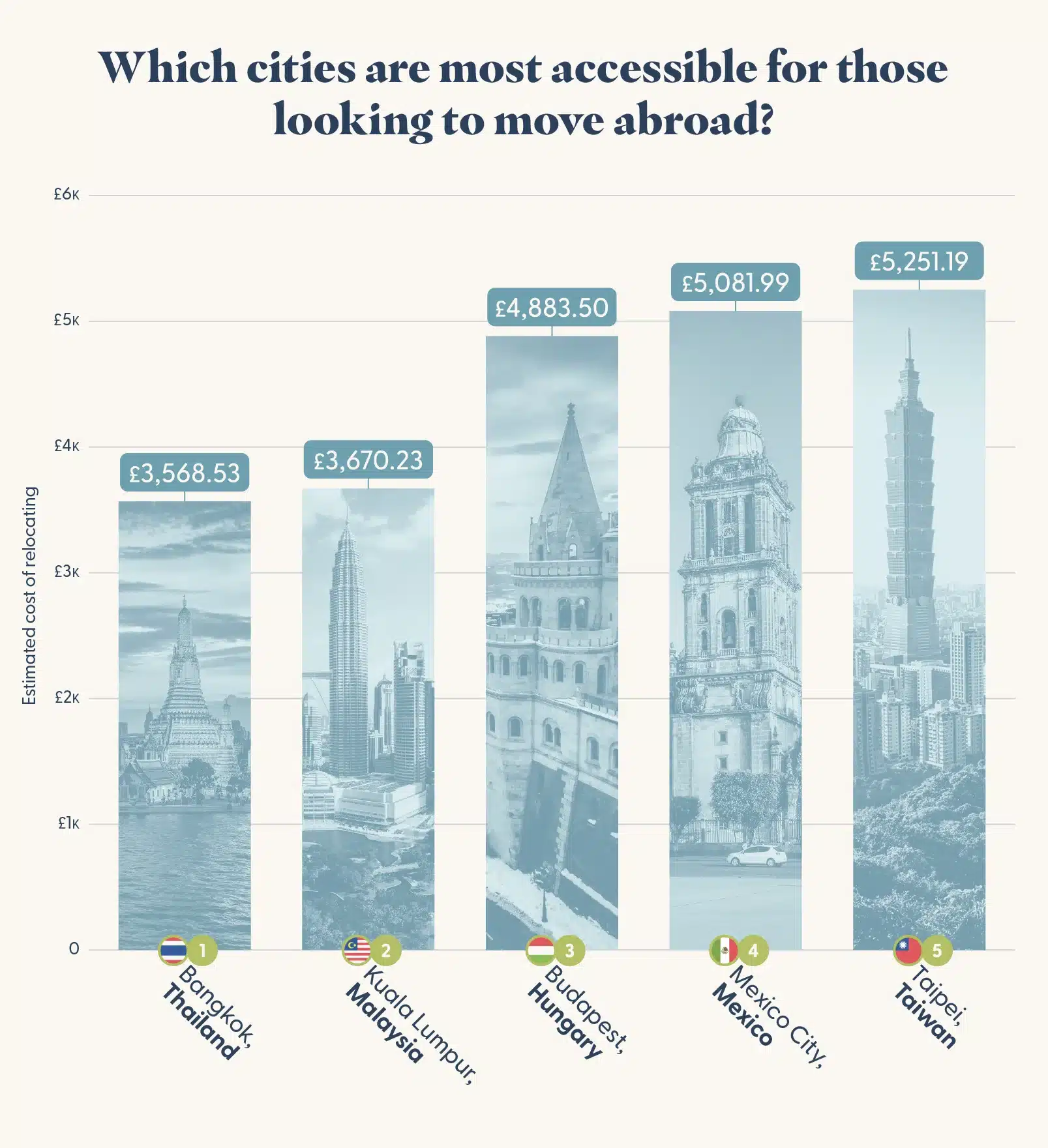
Which popular expat cities offer the cheapest cost to set yourself up for the first six months there? Asian, European, and North American spots all make the top 10, so let’s see where they are.
| Rank | City | Cost of a visa* | Six months rent | Rental deposit | Utilities + internet (six months) | Total basic furniture cost | Groceries (six months) | Public transport (six months) | Total cost |
|---|---|---|---|---|---|---|---|---|---|
| 1 | Bangkok, Thailand | £37.52 | £1,493.18 | £248.86 | £380.93 | £392.47 | £891.46 | £124.11 | £3,659 |
| 2 | Kuala Lumpur, Malaysia | £55.90 | £1,546.38 | £257.73 | £294.37 | £669.18 | £807.51 | £39.15 | £3,670 |
| 3 | Budapest, Hungary | £52.01 | £2,401.39 | £400.23 | £564.31 | £508.39 | £870.79 | £86.37 | £4,883 |
| 4 | Mexico City, Mexico | £51.56 | £2,334.42 | £389.07 | £341.89 | £468.94 | £1,367.78 | £128.33 | £5,082 |
| 5 | Taipei, Taiwan | £86.58 | £2,611.39 | £435.23 | £221.79 | £933.07 | £901.74 | £61.38 | £5,251 |
| 6 | Istanbul, Turkey | £206.20 | £2,916.28 | £486.05 | £316.46 | £577.51 | £939.79 | £192.72 | £5,635 |
| 7 | Athens, Greece | £156.04 | £2,544.74 | £424.12 | £829.98 | £559.55 | £1,071.03 | £117.95 | £5,703 |
| 8 | Tokyo, Japan | £17.32 | £2,894.84 | £482.47 | £756.85 | £458.07 | £1,553.44 | £229.17 | £6,392 |
| 9 | Málaga, Spain | £69.29 | £3,961.54 | £660.26 | £570.54 | £489.29 | £926.18 | £100.15 | £6,777 |
| 10 | Valencia, Spain | £69.29 | £4,112.91 | £685.49 | £589.5 | £489.29 | £946.82 | £114.03 | £7,007 |
*These figures are for the cost of a visa that will allow you to work within the country for more than six months. However, they should be used as rough guides only as work visa prices will depend on your nationality, length of stay, type of work, employer sponsorship, and additional fees.
1. Bangkok, Thailand
Estimated cost of relocating: £3,569 ($5,295)
In our analysis, Bangkok is the most cost-effective city to move to in our analysis, with an estimated relocation cost of just under £3.6k (approximately $5.3k). Rent for six months is just under £1,500, with utilities and internet adding almost £381 combined. Even furnishing your home with the essentials is affordable, coming in at just £392, based on the cost of basic home essentials at IKEA.
But cost alone isn’t why Bangkok is so popular with expats. The city is a perfect blend of modern convenience and deep cultural heritage. Think high-speed internet and rooftop bars just minutes from ornate temples and bustling street markets. Bangkok also easily allows people to visit some of the world’s best beach destinations in the many Thai islands, just one more reason that people move to Thailand.
If you’re considering moving to ‘The Land of Smiles,’ use Remitly to send money to Thailand to help you settle into your new life abroad.
2. Kuala Lumpur, Malaysia
Estimated cost of relocating: £3,670 ($5,306)
You could relocate to Kuala Lumpur for just under £3.7k ($5.3k) and enjoy a capital city lifestyle without the hefty price tag that comes with others. Like Bangkok, rent stays affordable at £1,546, with groceries, furniture, and public transport well below Western norms. Utilities are especially low at £208 for six months, one of the lowest of all cities in this study.
Outside of low costs, Kuala Lumpur has a solid community of expats, meaning you’ll likely be able to build a supportive network around you.
If you’re looking to move to Malaysia, the visa situation is one thing to remember. You can get a Malaysian Employment Pass for a relatively low price, but it typically needs to be renewed annually. You will also be liable to pay a visa fee in your home country. For payments you need to make when organising your new home, use Remitly to transfer money to Malaysia.
3. Budapest, Hungary
Estimated cost of relocating: £4,884 ($7,062)
Budapest may only be third on the list, with an estimated total cost of £4.9k ($7.1k). However, it’s still the most affordable European city to relocate to in our analysis, followed only by Istanbul in sixth place. While rent for six months is higher than its Southeast Asian counterparts, averaging at £2,401, essentials in Hungary like groceries (£871) and public transport (£86) remain attractive.
What makes Budapest stand out is the quality of life relative to cost. You’re not just getting a cheap place to stay here; you’re getting everything else that goes with the sought-after city. It’s known for its stunning architecture, historic thermal baths, and thriving nightlife, which is increasingly popular with young professionals across Europe.
Which cities cost the most to relocate to?
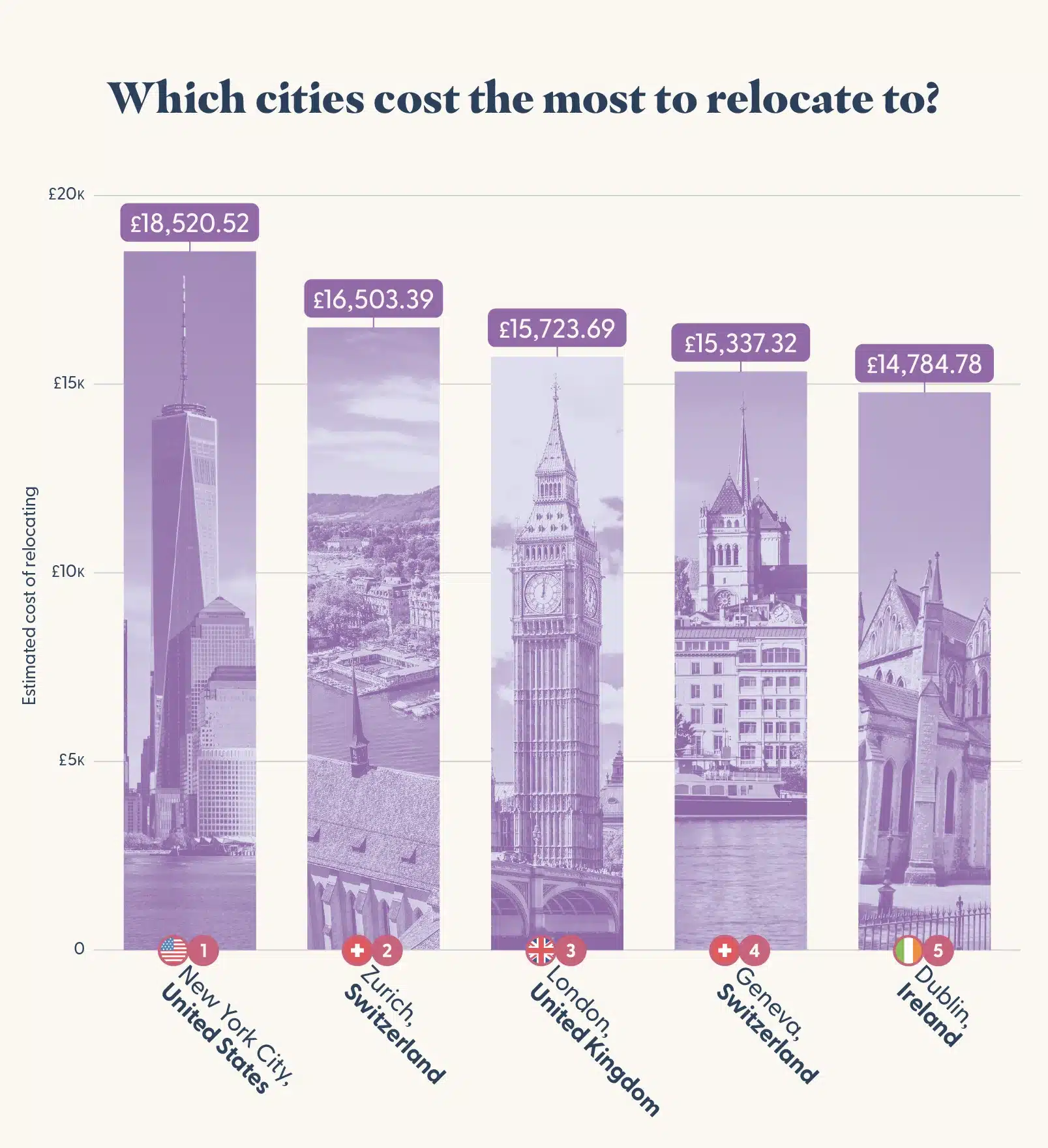
We’ve found the cheaper countries to move to, now which are the most expensive?
This doesn’t mean relocating to these countries is unattainable; it just means more careful planning and saving will be required.
| Rank | City | Cost of a visa* | Six months rent | Rental deposit | Utilities + internet (six months) | Total basic furniture cost | Groceries (six months) | Local public transport pass (six months) | Total cost |
|---|---|---|---|---|---|---|---|---|---|
| 1 | New York City, U.S. | £118.33 | £12,471.19 | £2,078.53 | £880.66 | £582.68 | £1,932.16 | £456.96 | £18,521 |
| 2 | Zurich, Switzerland | £63.49 | £10,184.96 | £1,697.49 | £1,076.39 | £553.16 | £2,558.55 | £369.35 | £16,503 |
| 3 | London, UK | £719.00 | £9,720.96 | £1,620.16 | £1,195.14 | £540.00 | £1,113.23 | £815.20 | £15,724 |
| 4 | Geneva, Switzerland | £63.49 | £9,213.37 | £1,535.56 | £1,106.57 | £553.16 | £2,568.00 | £297.17 | £15,337 |
| 5 | Dublin, Ireland | £867.01 | £9,023.66 | £1,503.94 | £1,171.43 | £577.78 | £1,188.77 | £452.19 | £14,785 |
| 6 | Singapore | £40.50 | £10,002.46 | £1,667.08 | £680.43 | £524.60 | £1,462.77 | £314.82 | £14,693 |
| 7 | Amsterdam, Netherlands | £329.49 | £8,714.00 | £1,452.34 | £1,200.88 | £418.14 | £1,308.93 | £359.79 | £13,784 |
| 8 | Hong Kong, China | £130.23 | £7,302.11 | £1,217.02 | £937.94 | £650.09 | £1,514.66 | £234.33 | £11,986 |
| 9 | Vancouver, Canada | £139.95 | £7,616.93 | £1,269.49 | £554.72 | £505.98 | £1,429.40 | £299.66 | £11,816 |
| 10 | Copenhagen, Denmark | £783.03 | £6,413.27 | £1,068.88 | £826.36 | £672.88 | £1,469.87 | £407.91 | £11,642 |
*These figures are for the cost of a visa that will allow you to work within the country for more than six months. However, they should be used as rough guides only as work visa prices will depend on your nationality, length of stay, type of work, employer sponsorship, and additional fees.
1. New York City, United States
Estimated cost of relocating: £18,521 ($25,787)
New York City demands a serious financial commitment upfront, with an estimated relocation cost of just over £18.5k ($25.8k). Rent alone is £12,471, with a rental deposit pushing that even higher at £2,079. You can check out our guide on how to find an apartment in New York City to try and find the best place for you at an affordable price.
Six months’ worth of utilities (£660) and groceries (£1,932) aren’t cheap either, and even a local transport pass will set you back £457 — more than the entire monthly rent in some countries.
So, why do expats still go here? New York and the United States are giants in culture and career opportunities. It’s home to the world’s biggest finance, media, and tech firms, while the city’s energy is electric.
For many professionals, artists, and entrepreneurs, the entry price is steep, but the potential payoff is even greater.
2. Zurich, Switzerland
Estimated cost of relocating: £16,503 ($23,416)
Zurich is clean, safe, and full of character – but it comes at a price. The city comes in second with a relocation cost of £16.5k ($23.4k), driven by high rents (£10,185) and a notably expensive grocery bill (£2,559 over six months). Even furnishing your home isn’t cheap, averaging £553 for basic furniture from IKEA.
But there are benefits, too. Zurich is consistently ranked among the world’s best cities for the quality of life of international employees, [1] with political stability, low crime, and a thriving economy. If you’re wondering how much you might need to have saved, we recently put together a guide on how much money you need to immigrate to Switzerland.
3. London, United Kingdom
Estimated cost of relocating: £15,724 ($21,997)
London rounds out the top three at £15.7k ($22k), and notably, it has one of the highest visa costs on the list at £719. This is based on a three-year skilled worker visa to the United Kingdom. However, there are other work visas, depending on your situation. For example, temporary visas are available for Seasonal Workers for just £298 if you plan a short-term relocation.
Despite the cost, London attracts global talent, investors, and creatives. It’s one of the world’s most connected cities — a finance, fashion, media, and tech hub, and we have a whole collection of guides to the country’s culture.
Navigating visa costs and applications
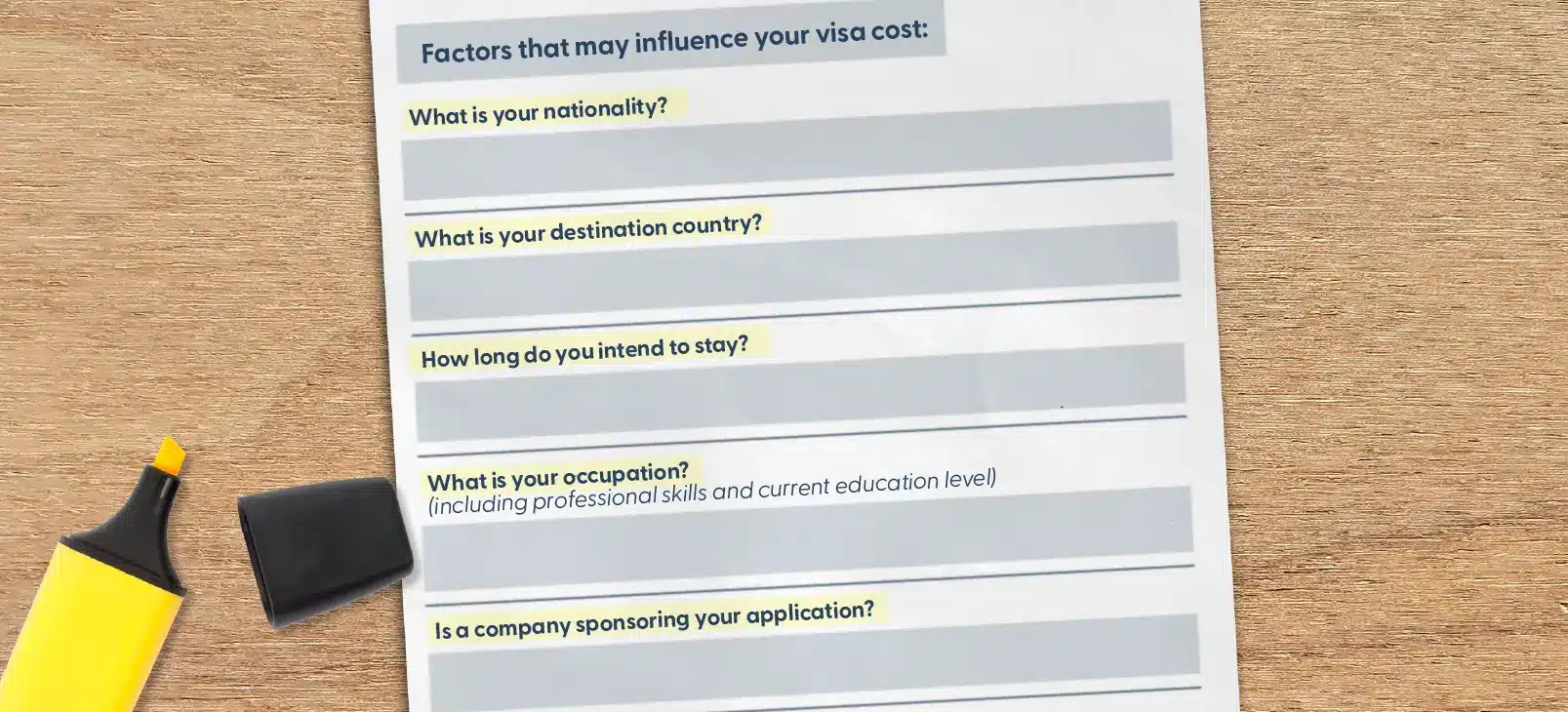
The above visa fees should only be used as a guide. You may find that they are more or less expensive when you research relocating yourself
Some factors that may influence your visa cost:
- Your nationality
- Your occupation, skills, and education level
- If a company is sponsoring you
- Your destination country
- How long you plan to stay
Visa costs can vary significantly. For instance, skilled worker routes are often more affordable than ‘open work’ visas, which allow you to move before securing employment.
Nationality also plays a significant role in visa costs. Many European countries offer an EU Blue Card that allows highly skilled non-EU nationals to live and work there relatively cheaply. However, this is not open to everyone, and you may find that the cost of your visa is much different.
Some visas also require a minimum salary. For example, the Netherlands has the highest requirement with their EU Blue Card, at £56,530 a year. [2]
Research, research, research
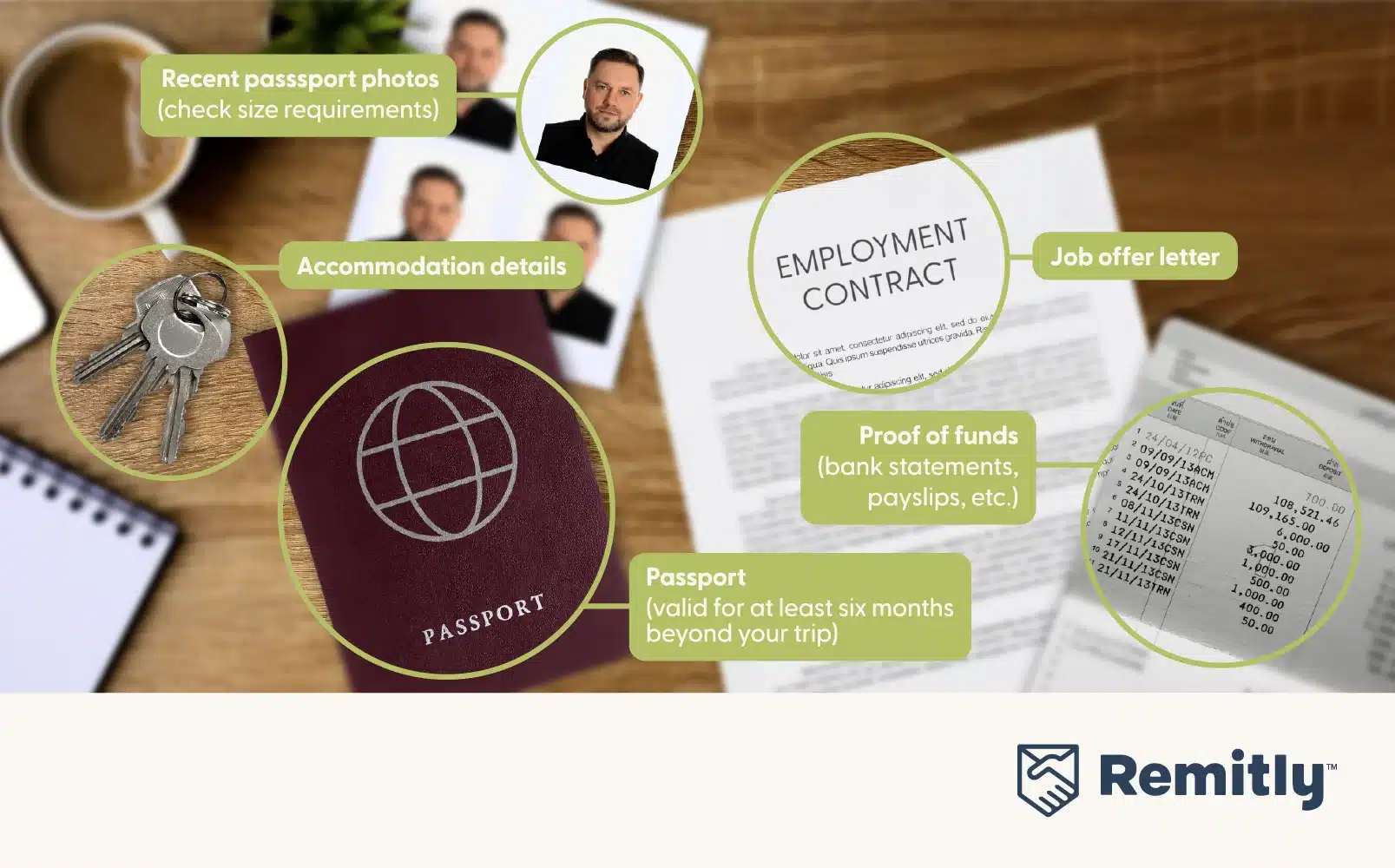
Getting the proper visa is down to you. You need to thoroughly research the work visas available in your destination country. Each type (long-term, short-term, skilled, open, etc.) has its requirements and applying under the wrong category is one of the most common reasons for rejection.
Then, get a checklist of the required documents and double-check that everything is in the correct format.
Typical documents may include:
- Passport (valid for at least six months beyond your trip)
- Recent passport photos (check size requirements)
- Proof of funds (bank statements, payslips, etc.)
- Job offer letter
- Accommodation details
Another thing to keep in mind is how long you need to leave between the visa application and your planned travel date. Processing times vary wildly depending on the country, season, and visa type, from a few days to several months.
Advice for those who want to move abroad
Moving countries can be challenging, whether relocating to Europe, the U.S., or Asia.
Make the most of this exciting time by doing the hard work in advance. As well as securing the correct visa, there are some more relocation considerations to keep in mind:
- Accommodation. Preferences for this differ from person to person. Some people prefer to organise their accommodation before they even set foot in the country, while others may prefer a temporary place to stay while doing in-person viewings.
- Documents needed. The last thing you want after relocating is to find you’ve left some vital documents in your home country. Banks, landlords, and employers often require multiple forms of identification and other paperwork.
- Taxes and take-home pay. When working out your budgets, you must focus on your take-home pay rather than your salary. Look into your destination’s income tax rates, social security contributions, and whether your home country has a double taxation agreement. Make sure to check whether your new country taxes foreign income or offers tax breaks for newcomers.
- Luggage. Will you travel light and get everything you need once you land, or would you prefer to send things through the post before you go?
- Community. Relocating is thrilling, but it can also be lonely. Research the expat community of your destination before you go and see if there are any groups you can join to build a strong network.
Five tips for saving up for your big move
Relocating can be expensive, but here are a few tricks to make saving easier.
1. Start a relocation auto-transfer
Set up an auto-transfer from your bank account every Friday (or however regularly you can manage) into a “move abroad” pot. It doesn’t have to be hundreds each week; it’s just what you can afford to put away.
Even a tiny amount can make a big difference. If you can put away £25 a week, you’ll have a pot of £1,300 in a year.
2. Open a high-yield savings account months in advance
You can pair this with the previous tip. Transfer your moving funds into a high-interest savings account instead of leaving them in your regular bank. Let this quietly earn while you plan the rest of your move. Even if you’re only earning this high interest over months.
3. Cancel subscriptions — but bank the difference
When you move, you’ll likely need to cancel several subscriptions, so one way to boost your savings is to cancel early and reallocate those funds.
Say you have two streaming services and one gym membership, which total approximately £80 a month. Cancel those a few months before you plan to leave the country and put that money into a “move fund” straight away.
4. Use local apps to plan your cost of living
The research above is a great place to start when looking at the average costs of relocating, but no one knows your spending habits as well as you do.
To see what expenses may look like, create real-time budgets using local grocery apps, takeaway apps, clothes sites, and Uber in your destination country to compare daily costs with those at home.
If you know you’ll want a takeaway once a week, plan for this and see how much it could cost you. The same goes for any non-essential shopping. With this knowledge, you’ll better understand how much you need to save before jetting off.
5. Buy your essentials on arrival using local cashback apps
Unfortunately, the saving doesn’t stop once you’re in your new country. One way to do this is to make your usual shopping habits work harder. Research local cashback apps and utilise these while you build up your stock of groceries, household essentials, and appliances.
You can then bank this cashback straight into your savings account.
Methodology
We used various sources, including InterNations, Reddit, and TikTok, to create a seed list of popular expat locations.
We then found the average work visa cost for each location using sources such as official government sites, InterNations, and VisaGuide.
Note: Work permit conditions vary widely between countries. Costs may depend on nationality, length of stay, type of work, employer sponsorship, and additional fees. These figures should be used as rough guides, and further research into each country’s requirements should be carried out.
We used Numbeo to find the average cost of the following in each country:
- Rent for a one-bedroom apartment outside the city centre.
- Utilities (Electricity, Heating, Cooling, Water, Garbage) for a 915 sq ft Apartment, and internet.
- Monthly groceries.
- Monthly transport pass.
Lastly, we used each country’s dedicated IKEA page to find the cost of basic furniture, including a two-seat sofa, double bed frame, double mattress, and a dinnerware set.
Currencies were converted using the Google Finance function on 14/04/2025 at approximately 16:00.
All data was collected in April 2025 and is correct as of then.
[1] https://www.mercer.com/insights/total-rewards/talent-mobility-insights/quality-of-living-city-ranking/
[2] https://blog.remitly.com/en-gb/immigration/best-countries-skilled-worker-visas/
